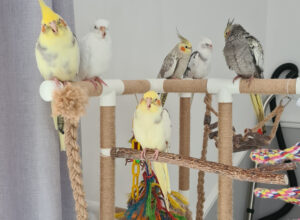Essential Cockatiel Care Guide
Key Takeaways
- Understanding Cockatiels: Learn about their origins, characteristics, and why they make great pets.
- Housing Needs: Essential information on cage size, placement, and setup.
- Diet and Nutrition: Guidelines on what to feed your cockatiel for optimal health.
- Health and Hygiene: Tips on grooming, signs of illness, and regular health check-ups.
- Behaviour and Training: Understanding their behaviour and how to train them effectively.
- Social Interaction: The importance of social interaction in a cockatiel’s life.
Cockatiels, with their distinctive crests and charming personalities, are among the most popular pet birds in the UK. As a cockatiel owner for many years, I’ve learned that while these birds are relatively easy to care for, they do have specific needs that must be met to ensure their happiness and health. This guide provides an in-depth look at essential cockatiel care, drawing from expert advice and personal experience.
Understanding Cockatiels
Origins and Characteristics Cockatiels are native to Australia and are a member of the cockatoo family. They are known for their playful nature and can live up to 15-20 years in captivity (sometimes longer!), making them a long-term commitment.
Why Cockatiels Make Great Pets
- Social and Affectionate: They enjoy human interaction.
- Intelligent: Capable of learning tricks and mimicking sounds.
- Low Maintenance: Compared to other pets, they are relatively easy to care for.
For more on understanding these delightful birds, visit our page on Understanding Cockatiel Behaviour.
Housing Needs
Choosing the Right Cage The cage is your cockatiel’s home, and it’s crucial to get it right.
| Feature | Recommended Specification |
|---|---|
| Size | At least 60 x 60 x 60 cm |
| Bar Spacing | 1.2 to 1.5 cm |
| Shape | Rectangular preferred |
For detailed guidance on setting up the perfect cage, check out Setting Up Cockatiel Cage.
Placement and Setup
- Location: Place the cage in a quiet corner away from direct sunlight and drafts, considering the Cockatiel Sunlight Care guidelines.
- Essentials Inside the Cage:
- Perches: Different sizes and textures. See Choosing Cockatiel Perches for more information.
- Toys: To keep them entertained and prevent boredom. Learn more at Preventing Cockatiel Boredom.
- Food and Water Dishes: Easily accessible. Understand their Cockatiel Hydration Needs.
Diet and Nutrition
What to Feed Your Cockatiel A balanced diet is crucial for your cockatiel’s health.
- Seeds: Should only make up about 25% of their diet.
- Pellets: High-quality pellets can be 50-60% of their diet.
- Fresh Fruits and Vegetables: Essential for vitamins and minerals. Visit Safe Fruits & Veggies for Cockatiels for a list of safe options.
For more on feeding your cockatiel, explore Cockatiel Feeding Basics.
Foods to Avoid
- Avocado
- Chocolate
- Caffeine
Health and Hygiene
Grooming
- Nail Trimming: As needed. Learn more at Cockatiel Grooming Essentials.
- Wing Clipping: Optional, but can prevent escape. I don’t clip my birds’ wings, some do for safety reasons.
- Bathing: Offer a shallow dish of water or mist them regularly.
Signs of Illness
- Changes in eating or drinking habits.
- Discharge from the nose or eyes.
- Lethargy or ruffled feathers.
For more on identifying signs of illness, visit Identifying Cockatiel Illnesses.
Regular Health Check-Ups Annual visits to an avian vet are recommended. For more information, see Cockatiel Veterinary Care.
Behaviour and Training
Understanding Their Behaviour
- Vocalisations: Cockatiels communicate through chirps and whistles. Learn more about Basics of Cockatiel Communication.
- Head Bobbing: Can be a sign of happiness or attention seeking.
- Biting: Often a sign of fear or discomfort.
Training Your Cockatiel
- Step-Up Training: Teaching them to step onto your finger.
- Trick Training: Simple tricks like waving can be taught with patience. For basic training commands, visit Training Cockatiel Basic Commands.
Social Interaction
Cockatiels are social creatures and thrive on interaction.
- Spend Time Daily: Aim for at least an hour of interaction each day. Understand more about their Cockatiel Social Needs.
- Multiple Birds: Consider adding a second cockatiel if you’re often away.
Conclusion
Caring for a cockatiel requires a commitment to providing a suitable environment, a balanced diet, regular health care, and plenty of social interaction. By understanding and meeting their needs, you can ensure a happy and healthy life for your feathered friend.
Remember, a well-cared-for cockatiel can be a delightful companion for many years. Enjoy the journey of pet ownership, and cherish the unique bond you’ll form with your cockatiel. For daily care tips, visit Daily Cockatiel Care.


I’ve tried everything to get my bird to eat fruit and veg but he refuses them. Will he suffer health wise without them?
Hi Sue! I’ve struggled too but I have found very specific veggies they will actually try. Tender stem broccoli, Kale, sweetcorn, peas and occasionally carrots if they’re grated up very small. You could try how you display it to them, I got some metal skewers to hang it from inside their cage so it appeals as almost a toy too. Health-wise you could try hum with pellets? They contain more of the good stuff than a seed only diet. But also I’ve heard stories of cockatiels living to old ages on a seed-only diet. I would say if you’re concerned about the health aspects, have a little chat with your local vet who will be happy to help I’m sure!